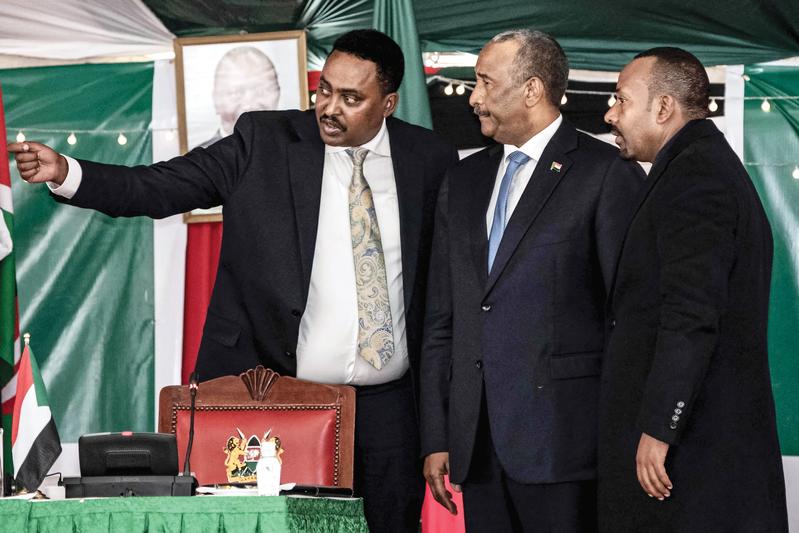 Chairman of Sudan’s Transitional Sovereign Council Abdel Fattah Al-Burhan (center) and Ethiopian Prime Minister Abiy Ahmed (right) attend the 39th IGAD extraordinary summit in Nairobi on July 5.
(TONY KARUMBA / AFP)
Chairman of Sudan’s Transitional Sovereign Council Abdel Fattah Al-Burhan (center) and Ethiopian Prime Minister Abiy Ahmed (right) attend the 39th IGAD extraordinary summit in Nairobi on July 5.
(TONY KARUMBA / AFP)
Ethiopia’s Prime Minister Abiy Ahmed and Chairman of Sudan’s Transitional Sovereign Council Abdel Fattah Al-Burhan reached consensus on July 5 for peaceful resolution to disagreements, after the two leaders met for the first time since the two countries’ falling-out over a border conflict that began a few weeks ago.
The meeting happened on the sidelines of the 39th Intergovernmental Authority on Development’s Extraordinary Summit of the Assembly of Heads of State and Government held in Nairobi, Kenya.
After the meeting, Ahmed took to Twitter to announce that the two countries had reached consensus that their people have plenty of shared aspirations in life and need to work on peacefully achieving them.
“In my discussions with Abdel Fattah Al-Burhan, we have both agreed that our two countries have plenty of collaborative elements to work on peacefully. Our common bonds surpass any divisions. We both made a commitment for dialogue and peaceful resolution to outstanding issues,” Ahmed said.
Al-Burhan said the meeting gave them an opportunity to take stock of the response to challenges in the region, adding that Sudan is happy to convene in a very short time to discuss the matter.
Talks between the two leaders follow fighting in a volatile border region last month, in which Sudan said Ethiopian forces had captured and killed Sudanese troops, a claim which was denied by Ethiopia.
The meeting focused on peace and security in the East African region with focuses on conflict, terrorism and violent extremism, the proliferation of illicit arms, illegal migration and human trafficking.
Al-Burhan, who chaired the meeting, said it comes at a crucial time when the region is besieged by a wide spectrum of challenges and threats both internally and externally.
“Peace and security are the bedrock of prosperity, development and regional integration. Therefore, conflicts are the single biggest threat to our success as states and societies,” he said.
Uhuru Kenyatta, Kenya’s president and the meeting’s host, called on IGAD heads of state and government to work toward sustainable solutions to address regional peace and security. Kenyatta cited violent extremism, drought and armed conflicts as some of the urgent challenges.
“In the past two years alone, the region has experienced a desert locust invasion, a crushing drought that is still ongoing, numerous threats related to violent extremism, armed conflicts and, like the rest of the world, the region has not been spared from the COVID-19 pandemic,” Kenyatta said.
He said the drought, the worst in 40 years, has intensified food insecurity in the region.
The Intergovernmental Authority on Development, or IGAD, is an eight-member trade bloc made up of countries from the Horn of Africa and neighboring states.
The region stretches over an area of 5.2 million kilometers that comprises Djibouti, Eritrea, Ethiopia, Kenya, Somalia, South Sudan, Sudan and Uganda.
On July 4, Al-Burhan said the Sudanese army will not participate in internationally led talks to break its stalemate with the civilian opposition, and urged political and revolutionary groups to start discussions to form a transitional government.
In a televised address to the nation, Al-Burhan pledged to dissolve the sovereign council after the formation of a new government, noting that a supreme council of the Sudanese Armed Forces and the Rapid Support Forces will be established to command the regular forces.
Sudan has been suffering a political crisis since Al-Burhan, also the general commander of the Sudanese Armed Forces, declared a state of emergency on Oct 25, 2021, and dissolved the sovereign council and the government.
After the military takeover, the UN political mission in Sudan, the African Union and the IGAD have been trying to broker a way out of the political impasse.
Al-Burhan said on July 4 that the army’s decision not to participate in talks was to allow political and revolutionary groups to form a government. The current stalemate was mainly due to refusal of most civilian groups to negotiate with the military.
He called on civilian groups to start a serious dialogue to bring the country back to a democratic transition. The military will be committed to implementing the outcomes of the dialogue, he said.


